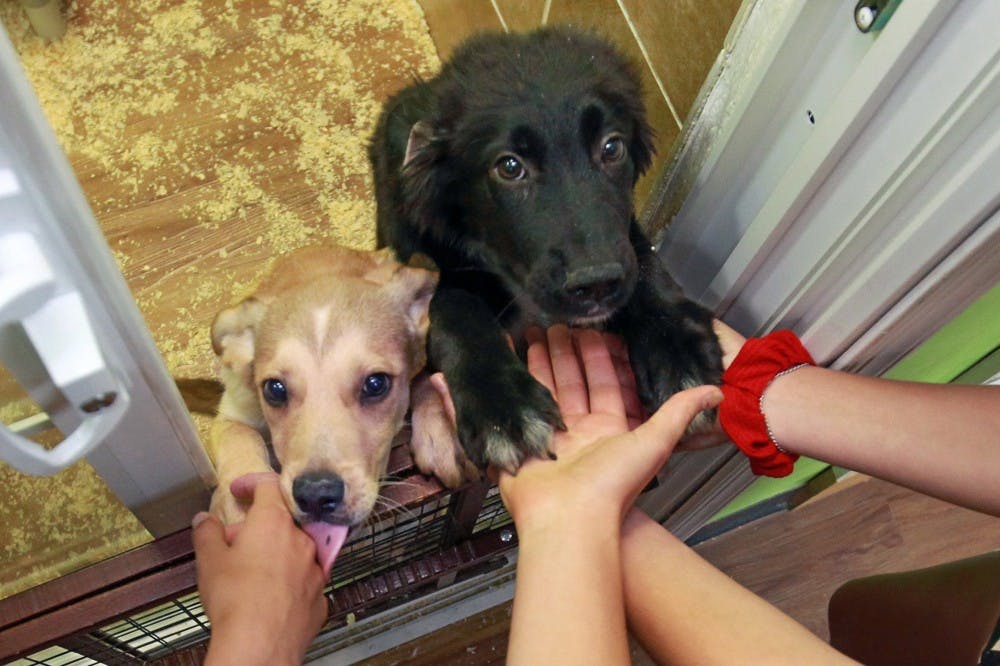Students that look to buy their first puppy have multiple choices to make when getting a dog, but after Tempe passed a new law banning the sale of dogs from puppy mills there are a fewer choices to make.
Every year, 2.11 million dogs from puppy mills are sold in the U.S. despite the 3 million dogs killed in shelters because they could not find homes, according to DoSomething.org, a non-profit organization that promotes social change.
“There are a large volume of adoptable animals that come through our Valley’s shelters,” Steven Hansen, CEO and President of the Arizona Humane Society, said.
Hansen said the dogs that are sourced from puppy mills are raised in “very poor conditions.”
He said puppies are kept in cages with wire bottoms that are raised above the ground so that feces fall to the floor, and the wire bottoms injure the puppies’ paws.
The dogs are often confined to small spaces, sometimes with multiple other dogs.
Hansen also mentioned dogs are not usually taken on walks or socialized and the puppies can be filthy, covered in feces and have parasites.
“Reputable breeders do not sell their animals to pet stores,” Hansen said.
Michael Morefield, Arizona Animal Welfare League Marketing and Communications Manager said the rescue group will avoid targeting local breeders who take better care of animals by interviewing prospective owners and taking back pets who are not a good match.
“All she cares about is people having a wonderful life with these animals and propagating this wonderful species,” Morefield said of a Golden Retriever breeder.
Morefield said it is a misconception that certain dogs are not available in shelters, and AAWL had two Yorkies, a Boston Terrier and an English Bulldog in the shelter recently.
Morefield said puppy mills are the target of the new law as they see the animals as a “cash crop” like corn or soybeans.
“Every shelter is not ever making money off adoption,” Morefield said. “(AAWL’s) mission is to end pet homelessness in Arizona.”
Both Morefield and Hansen said their shelters have open adoption policies that insure pets are placed in homes where they will be taken care of. The shelters have a much more lenient policy on returning an animal, which can be difficult to do with a pet store.
Students are often seen as being poor animal owners, but Morefield said “that’s not true.”
Morefield said while student’s abandoning or returning pets can be an issue, just because someone is a student does not mean they will be a bad owner.
As part of AAWL’s adoption process, the organization asks people whether they will be able to take care of an animal not only now, but also in 10 or more years.
Morefield said having a pet means making certain lifestyle choices such as, moving into a house where a large breed dog will have enough space.
“We have those really important conversations with people,” Morefield said.
Students still can make decisions without having the foresight to handle challenges of pet ownership.
Morefield said the Petsmart at Tempe Marketplace told AAWL that they have a higher return rate on smaller animals at most of the store’s locations. AAWL also received a cat that was living as part of a feral cat community that had been adopted by a student whom they were unable to contact.
Morefield said people get in situations where their finances change or their animal develops a medical condition and they feel their only option is to surrender their animal.
To help people feel less alone, Morefield said AAWL offers a low cost clinic, behavior hotline, info before adoption, pet insurance training classes and a sleepover program where people can get to know an animal in their home for a period of time before making a decision on adoption.
“Shelter dogs know that you are doing something to save their life,” Morefield said.
The Tempe City Council passed a law Feb. 11 that banned the sale of dogs from commercial breeders often known as puppy mills.
The vote passed unanimously with city councilwoman Lauren Kuby strongly coming forward in support of the ordinance.
The new law has received wide support from local animal shelters.
The law does not prevent people from going through a small, local breeder that raises the animals in proper conditions.
The law, which takes effect in three months will affect the one pet store in Tempe, Animal Kingdom, located in Arizona Mills Mall.
Frank Mineo, the store’s owner sought legal representation after opposing the law, but his lawyer did not respond to request for comment.
“We are not going after (Mineo’s) store,” Morefield said.
Journalism sophomore, Katie Malles who volunteers with AAWL said that she is very happy that the new law passed.
“(Puppy mills) just create so many problems,” Malles said.
After volunteering in multiple animal shelters, Malles said she thinks people do not realize how many lovable animals can be found in shelters.
Malles said adopting from AAWL has the benefit of having an animal that you know has been seen in their clinic and has all of its shots as opposed to a pet store where you have no guarantee of where your dog comes from.
“People just don’t take the time to go into their local animal shelter,” Malles said.
Reach the reporter at lmarsha6@asu.edu or follow @lmarsh2014 on Twitter.
Like The State Press on Facebook and follow @statepress on Twitter.




